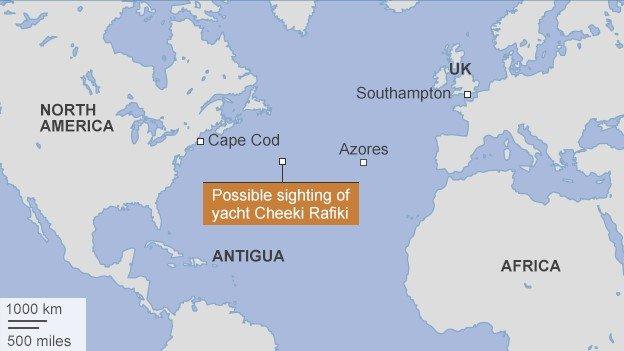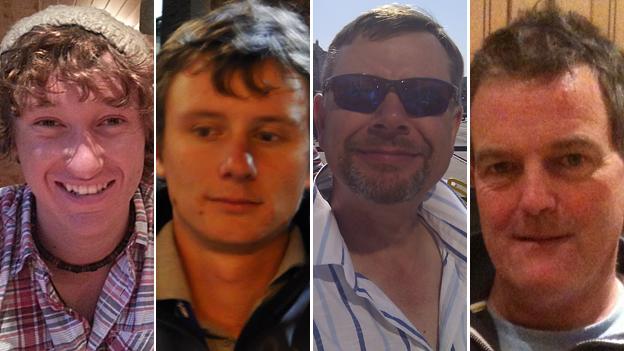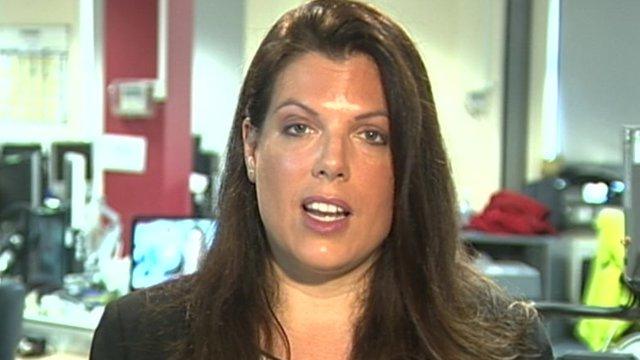Families want search for UK yacht to resume
- Published
David Bridge, father of skipper Andrew (second left): "We all think they're in the life raft"
The families of four British sailors missing since their yacht capsized in the Atlantic Ocean have appealed to the US Coastguard to resume their search.
Contact with the men was lost on Friday after they reported running into difficulties about 1,000 miles (1,600km) off Cape Cod, Massachusetts.
The father of skipper Andrew Bridge said he believed the men had escaped the boat into a life raft.
The US Coastguard-led air and sea search was called off on Sunday.
'Saturated area'
The Royal Yachting Association (RYA) named the four crew members as Mr Bridge, 22, from Farnham, Surrey, the yacht's skipper; Paul Goslin, 56, from West Camel, Somerset; Steve Warren, 52, from Somerset, and 23-year-old James Male, from Southampton.
They were returning from a Caribbean sailing event when their boat, the Cheeki Rafiki, began taking on water.
Mr Bridge's father David told BBC Surrey that weather in the area had improved and called on the US coastguard to resume their search.
He added: "We all think they are in the life raft. We think they abandoned the ship, one personal beacon was set off and when that died, they set another beacon off, which would suggest they were somewhere safe enough to be able to do so."
Cressida Goslin, the wife of Paul Goslin, said she hopes the men will be found alive, but is worried "they are not being given a chance".
She added: "If we don't try to rescue them we are just going to leave them to starve to death."
Mr Warren's sister Kay Coombes added: "We appreciate everything that the US coastguard and the Canadian coastguard has already done but we would just like them to search a little bit longer."
Kay Coombes, sister of Steve Warren, tells 5 live: "We're absolutely desperate"
She described the crew as "very strong" and said she believed they managed to escape to a life raft.
Speaking to the Times, Mr Male's father Graham said: "We just want them to continue searching."
Very experienced
Caroline Nokes, the Conservative MP for Romsey and Southampton North, said the men were well-equipped and trained for an emergency.
The families were "desperately keen that the search be resumed, that although conditions are not good they're better than they were when the search started", she added.
Robin Knox Johnston, President of the Sail Training Association, said it was possible the men could still be alive.
He said life rafts were designed to be accessible in emergency situations and it was "very likely" they could have escaped.

The search took place over more than 4,100 square miles in the mid-Atlantic
Sea conditions
The crew ran into difficulties on Thursday while returning from Antigua Sailing Week.
They were delivering the vessel back after it participated in the week - one of the world's top regattas - when it started taking on water.
The RYA said typical supplies on a life raft would include survival suits, water, food, flares and a first aid kit.
Three US and Canadian aircraft and three merchant vessels looked for them on Friday and Saturday.
On Saturday, a cargo vessel which was helping with the search spotted and photographed an overturned hull which matched the description of the Cheeki Rafiki but reported no signs of people on board or a life raft.
The US Coastguard said the search area had involved approximately 4,146 square miles and it was "extremely disappointed" not to have found the sailors.
Winds at the start of the search were said to have been blowing at more than 50mph, the sea reached heights of up to 20ft and visibility was reduced to under a mile.
The Foreign Office confirmed it was aware of the missing yacht: "We are in contact with the US Coastguard and have offered consular assistance to the families."
- Published18 May 2014

- Published19 May 2014
